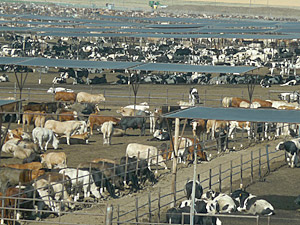
Although those of us in the Grus clan are not particularly fond of prepared, processed food, we do realize that the act of breaking bread together has been a symbol of peaceful human communciation for generations. But now decisions about what to eat have become very complicated. No one agrees about what humans SHOULD eat, let alone what they want to eat. Issues surrounding food include ethical questions about the treatment of workers and other animals in food production, the environmental cost of producing (and moving) the food, and the nutrition and health concerns associated with different food choices.
On the One Hand


Like most of us in the Grus clan, humans are omnivorous. Unlike us, however, humans rarely feel satisfied with the protein in a few grubs. Many humans prefer to get the bulk of their protein from meat. While most studies suggest that humans restrict their intake of saturated fat, the protein and B vitamins in meat are considered by many to be essential to a healthy diet, particularly if the meat is raised in uncrowded conditions without antibiotics.
On the Other Hand

Meat production is hard on the planet. It produces an estimated 20 percent of the greenhouse gases that lead to climate change. Studies suggest that antibiotics fed to livestock contribute to the increasing proliferation of antibiotic resistant diseases. Despite this heavy use of antibiotics (or perhaps because of it), crowded livestock also act as a reservoir for diseases like avian flu, which endanger humans and other animals. Meat production also uses a tremendous amount of water.
The living conditions of animals destined for the human table also provide ethical challenges.